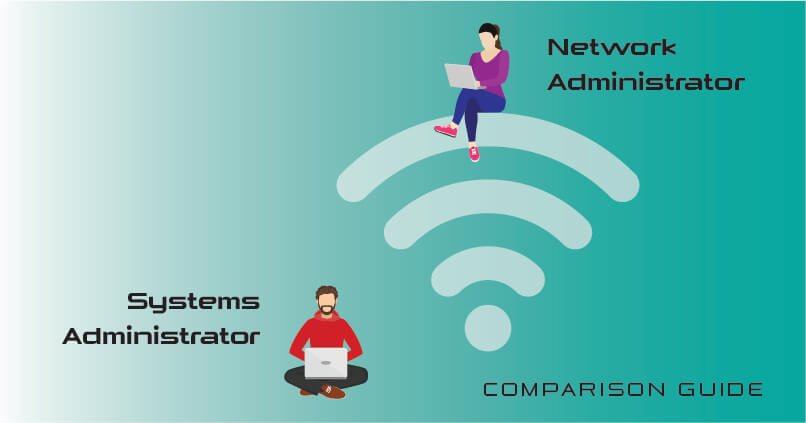Computer networking serves as the foundation for nearly every business, household and personal activity, and the spread of artificial intelligence (AI), machine learning, Internet of Things (IoT) devices, blockchain solutions and advanced analytics is accelerating network innovation.
Now more than ever, businesses and organizations of all sizes and missions need information technology experts to manage their computer networks and keep them running smoothly. That’s where network administrators come in.
Read on to learn more about the responsibilities of network administrators, career and salary outlooks and advice on how to position yourself for success in this widely sought-after role.
What Is a Network Administrator?
Computer and information technology jobs continue to grow, with roughly 356,700 openings projected each year between 2023 and 2033, according to the U.S. Bureau of Labor Statistics (BLS). Network administrators fall under that umbrella of in-demand jobs, since they are responsible for the daily operations of computer networks.
Since these types of IT positions are in high demand, a network administrator role is often a secure and lucrative one with the ability to work within a wide variety of industries, including health care, hospitality, retail, finance and more. Many medium-to-large-sized companies are in increasing need of a network administrator, regardless of what services or products they sell. In smaller companies, sometimes this position overlaps with a systems administrator or another IT professional.
Network Administrator vs. Systems Administrator
While both network and systems administrator roles revolve around IT — and for some smaller companies, the roles may be merged — there are differences in the skills needed to succeed in each of the roles. Network administrators focus on monitoring, configuring and maintaining networks. Systems administrators’ main duties include configuring and maintaining computer systems and servers, installing and updating software, research and development and troubleshooting computer and server systems.
What Does a Network Administrator Do?
According to CareerExplorer, “Network administrators analyze the needs of an organization, install and maintain the necessary hardware and software to meet those needs and solve any problems that arise along the way.” Network administrators normally work in an office setting and are in demand in a variety of industries, including education, manufacturing, financial services, telecommunications and more.
Other key responsibilities, as highlighted by Network Interview, include:
- Monitoring the network
- Ordering network equipment, including firewalls, switches, etc.
- Configuring/racking/testing network equipment
- Providing regular network maintenance for patching and updates
- Network troubleshooting
- Installing and maintaining cabling
Current Demand and Future Outlook for Network Administrators
Employment for network and computer systems administrators is projected to decline by 3% from 2023 to 2033, yet the BLS still anticipates about 16,400 openings every year as veterans retire or move into new roles. The numbers look modest, but several forces keep skilled professionals in demand:
- Automation and AI are removing many low-level tasks, not the complex ones.
TechTarget reports that organizations have adopted Ansible, Terraform and other orchestration tools to speed routine changes, which means they now look for administrators who can script, integrate APIs and troubleshoot automation itself. - Hybrid-cloud and edge deployments require new expertise.
Rapid adoption of software-defined networking, zero-trust architectures and private 5G has shifted hiring toward candidates who understand virtualized, policy-driven environments. - Broad IT growth offsets niche contraction.
While the specific administrator title may shrink slightly, overall computer and IT occupations are set to expand much faster than average, creating pathways to adjacent roles like cloud networking or security engineering. - Compensation remains competitive.
The 2024 Skillsoft IT Skills & Salary Report lists an average U.S. network-administrator salary of $93,126, with engineers and architects clearing six figures, underscoring ongoing value for advanced skills.
Bottom line: Routine network upkeep is becoming automated, but employers still need professionals who can design resilient hybrid environments, secure them and keep critical services online — skills that automation, at least for now, cannot fully replace.
How Much Do Network Administrators Make?
The median pay for network and computer administrators is $96,800, according to the BLS, with the highest 10% earning more than $150,320. States where network systems administrators earn the highest annual salaries include:
- California — $139,880
- Massachusetts — $138,016
- New Jersey — $137,458
As you can see, network administrator salaries vary, and contributing factors include job level, geographic location, education and experience. Salary estimates vary and are often adjusted in real-time based on changing data.
How to Become a Network Administrator
In most cases, an associate’s or bachelor’s degree in computer science or information technology is required for this position. There are also numerous certificates that may help you position yourself for a higher-paying job, such as CompTIA Network+, CompTIA Security+ and Cisco’s CCNA. In some cases, it might be helpful to pursue vendor-specific certifications, depending on the products and platforms your employer works with.
Advanced degrees are typically not required for a network administrator position, but they can help you stand out against the competition, and in some cases, they may be preferred or required by certain employers.
Steps to Becoming a Network Administrator
- Pursue an associate or bachelor’s degree in an IT-related field
- Get an entry-level job and familiarize yourself with the industry
- Consider higher education, such as a master’s degree
- Determine which, if any, cybersecurity certifications would be beneficial for you
- Stay up-to-date with cybersecurity news and best practices
How Long Does it Take to Become a Network Administrator?
If you pursue an associate’s degree, you could become an entry-level network administrator within a few years, whereas a bachelor’s degree typically takes three to five years. It’s also wise to think about earning internship experience.
Entry-level network administrator positions are available, but more advanced and senior-level roles require additional years of experience and sometimes more education. Certifications are also valuable and may help you secure a position more quickly.
Given the recent dip in projected openings for this specific title, a master’s degree in cybersecurity or network engineering can provide the specialized cloud, automation and leadership skills that set candidates apart. Programs like USD’s MS in Cyber Security Operations and Leadership or MS in Cyber Security Engineering deepen technical expertise while signaling commitment to employers, potentially tipping the scales in a tighter job market. Both graduate tracks are designed for working professionals and can be completed in as few as 20 months.
Network Administrator Hard Skills
If you’re thinking about pursuing a network administrator career path, here are some hard skills that are often required for the position, according to TechRepublic:
- 2+ years of networking troubleshooting or technical experience
- Knowledge of complex networks
- The ability to manage, control and monitor server infrastructures
- Knowledge of and experience with a Local Area Network (LAN), Wide Area Network (WAN) and Virtual Private Network (VPN)
Network Administrator Soft Skills
Hard skills may demonstrate your knowledge and experience, but soft skills can often illustrate your ability to collaborate with others and help you successfully build relationships within a company, organization or industry.
“Managing time, adapting to new situations and working well under pressure are all soft skills that transfer to any workplace environment at any level of experience,” according to Indeed.
TechRepublic explains that “companies are prioritizing soft skills in their IT professionals, and these skills apply to network administrators.” These include:
- Flexibility
- Being collaborative
- Being a team player and a leader
- The ability to interact with multiple levels of an organization
- Working independently without supervision
- Effective communication
- Adaptability
Common Certifications Needed
In some cases, certain certifications are required for network administrator positions. Here is a breakdown of the most common ones:
- Cisco Certified Network Associate (CNNA) — Confirms your ability to work with routed and switched networks. This is Cisco’s most popular certification, according to ITCareerFinder.
- Cisco Certified Network Professional Routing & Switching (CCNP R&S) — Suitable for professionals with one year of experience who are looking to work independently on complex network solutions.
- Network+ (CompTIA) — A globally recognized certification, this is a good starting point for IT professionals since there are no prerequisites.
Types of Careers in Network Administration
The education-based resource ComputerScience outlines the following positions and job descriptions that are related to network administration:
- Computer Systems Analyst — Assesses an employer’s IT needs and helps design, implement and maintain hardware and software.
- Computer Programmer — Writes, tests and corrects code for applications and programs, often using C++ and Java.
- Computer and Information Systems Manager — Works with companies, businesses and organizations on hardware and software, including overseeing installation and coordinating needs based on budget.
- Software Developer — Designs and builds software applications, including maintaining detailed records related to performance and upgrade recommendations.
- Computer Network Architect — Builds LANs, WANs and VPNs. Installs hardware and software, maintains security procedures and researches new technology.
The breakdown of entry- to late-career salary varies. The chart below was compiled from Glassdoor salary data sourced in August 2025.
| Entry-level (0–2 years) | Mid-career (4–6 years) | Late-career (15+ years) | |
| Computer Systems Analyst | $89,000 | $107,000 | $125,000 |
| Computer Programmer | $72,000 | $88,000 | $117,000 |
| Computer and Information Systems Manager | $88,000 | $96,000 | $125,000 |
| Software Developer | $95,000 | $119,000 | $155,000 |
| Computer Network Architect | $101,000 | $118,000 | $158,000 |
Where Can I Work as a Network Administrator?
A recent search of network administrator positions on LinkedIn revealed more than 800 results. (You can see the complete list here.) Other job titles that you might see in your search include network/system administrator, network engineer, IT system administrator, end user support network technician and more.
Here is a sampling of the companies that are hiring for this type of in-demand position:
- DISH TV
- VCU Health
- Oak Ridge National Laboratory
- Booz Allen Hamilton
- Dice
- FujiFilm
- Coca-Cola
- Ericsson
Best Geographic Markets for Network Administrator Jobs
There are network administrator job opportunities across the United States, but some regions are more heavily concentrated than others. The states with the highest employment level of network and computer systems administrators include:
| State | Employment | Annual Mean Wage |
| Maryland | 8,760 | $122,000 |
| Washington, District of Columbia | 1,480 | $118,910 |
| California | 28,730 | $114,500 |
| Massachusetts | 7,440 | $110,010 |
| New Jersey | 10,300 | $106,960 |
Source: Bureau of Labor Statistics
Metropolitan areas with the highest employment levels include:
| Area | Employment | Annual Mean Wage |
| New York-Newark-Jersey City-NY-NJ | 19,080 | $119,240 |
| Washington-Arlington-Alexandria-DC-VA-MD-WV | 11,280 | $124,920 |
| Dallas-Fort Worth-Arlington, TX | 11,780 | $105,280 |
| Los-Angeles-Long Beach-Anaheim, CA | 9,000 | $111,720 |
| Denver-Aurora-Centennial, CO | 4,980 | $108,630 |
Source: Bureau of Labor Statistics
Continuing Education for Network Administrators
In addition to certifications and other educational opportunities, earning a master’s degree can greatly expand your knowledge and skills and give you a competitive edge in the job market.
Advanced degrees in IT, cybersecurity, network defense and computer science can help you take your network administrator career to the next level.
How Do I Find a Job in Network Administration?
Internships are not only a good way to gain experience, but also to get your foot in the door with a potential employer. In addition to traditional job boards and online sites (Indeed, ZipRecruiter, LinkedIn), there are many industry-specific resources such as Enterprise Connect and the Network Professional Association (NPA).
When it comes to the job search, here are a few helpful tips from Indeed:
- Customize your resume — Don’t use the same resume for every job application. Make sure yours matches the description of the job for which you’re applying, which means adding skills and any relevant experience.
- Research companies — Before you apply, research the hiring companies, which can give you a better idea of the company culture, benefits and salary range, work environment and more. You can also use some of this information to your advantage in your cover letter and interview.
- Schedule informational interviews — In this type of interview, you sit down with professionals in the industry or company you’d like to work for to find out more information (as opposed to applying for a specific job). This is a great piece of advice for any applicant, regardless of industry, and it can bolster your network.
Professional Resources for Network Administrators
Cybersecurity organizations are a great way for those in the industry to keep up with current happenings, collaborate with like-minded individuals and more.
Network Professional Association (NPA)
The NPA is an organization dedicated to promoting ethical and professional practices in the IT/network computing profession. They have numerous resources to help improve technical knowledge, an extensive career center, webinars and events and more.
Association for Women in Computing (ACW)
One of the first professional organizations for women in computing, AWC is dedicated to promoting the advancement of women in the computing professions.
Computing Technology Industry Association (CompTIA)
CompTIA promotes industry growth through education, training, certifications, philanthropy and market research.
Association for Computer Machinery (ACM)
ACM supports the professional growth of its members by providing opportunities for career development, lifelong learning and professional networking.
Frequently Asked Questions
What Are Some Other Top Cybersecurity Careers?
Cybersecurity is a fast-growing, high-paying field with a range of different types of job openings. Which role might be ideal for you? Take a moment to explore some of the other exciting careers in cybersecurity:
Chief Information Security Officer (CISO)
Curious about pay, prerequisites and day-to-day work for the roles above? The guides below lay it all out:





